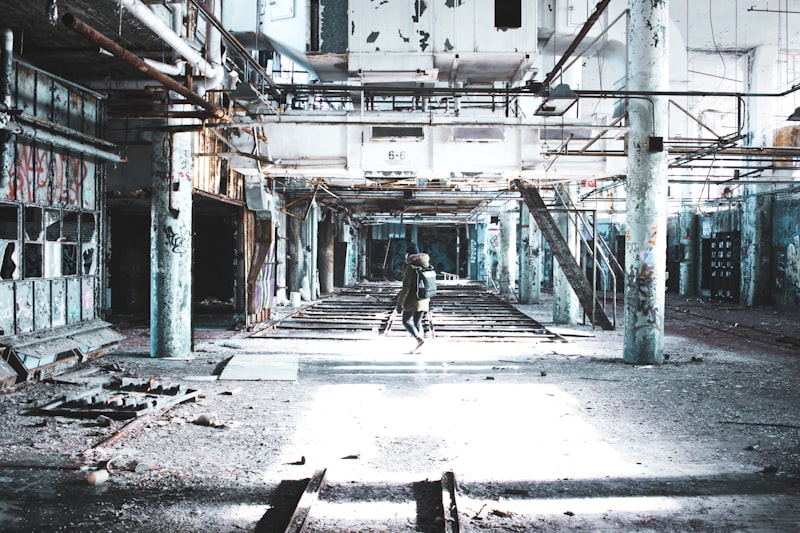
Detroit, a city that boasts a rich history and vibrant culture, is located in the United States of America. Situated in the state of Michigan, Detroit enjoys a prime location in the southeastern part of the state, near the border with Canada. This strategic positioning has played a significant role in shaping the city’s development and identity over the years.
As one of the largest cities in the Midwest region, Detroit holds a special place in American history. It was founded in 1701 by the French explorer Antoine de la Mothe Cadillac and quickly became an important trading hub due to its proximity to the Great Lakes. The city’s name itself pays homage to its French roots, derived from the French word “détroit,” meaning strait, as it is situated on the Detroit River, connecting Lake St. Clair and Lake Erie.
Over time, Detroit gained prominence as a major industrial center, earning the nickname “Motor City” for its pivotal role in the rise of the American automobile industry. Renowned car manufacturers like Ford, General Motors, and Chrysler established their headquarters or major production facilities in the area, driving economic growth and shaping the city’s skyline.
Beyond its industrial significance, Detroit also holds cultural importance. It is known as the birthplace of Motown music, home to legendary artists such as Stevie Wonder, Aretha Franklin, and Marvin Gaye. The city’s diverse population has contributed to its vibrant arts, food, and entertainment scenes, making it a hub for creativity and innovation.
Despite facing economic challenges and urban decay in recent decades, Detroit has undergone a revitalization process in various areas. Efforts have been made to restore historic neighborhoods, attract new businesses and investments, and enhance public spaces. Today, visitors to Detroit can explore its world-class museums, enjoy lively sports events, and witness the revival of its architectural gems.
Detroit is located in the United States of America, specifically in the state of Michigan. With its unique history, industrial heritage, and cultural significance, the city continues to captivate visitors and residents alike, offering a blend of past and present that makes it an exciting destination to explore.
Detroit: The Motor City Gem of the United States
When it comes to American cities with a rich automotive history, Detroit undoubtedly takes the crown. Known as “The Motor City,” Detroit has played a pivotal role in shaping the automobile industry and has become synonymous with innovation, passion, and craftsmanship. From its iconic assembly lines to its vibrant cultural scene, there’s no shortage of reasons why Detroit remains an essential gem of the United States.
One cannot discuss Detroit without mentioning the Big Three automakers: General Motors, Ford, and Chrysler. These legendary companies have their roots deeply embedded in the city, and their influence on the automotive world is immeasurable. Over the years, they have produced some of the most iconic vehicles, revolutionizing transportation and setting new standards for design and performance.
But Detroit’s significance extends beyond manufacturing powerhouses. The city boasts a unique blend of historical landmarks, modern architecture, and captivating art scenes. Take a stroll through the mesmerizing Detroit Institute of Arts, home to masterpieces by renowned artists like Van Gogh and Diego Rivera. Explore the Henry Ford Museum, where you can immerse yourself in the fascinating history of American innovation and marvel at iconic artifacts like the Rosa Parks bus.
Detroit’s revitalization efforts have transformed abandoned factories and warehouses into trendy art galleries, chic restaurants, and hip music venues. The city’s bustling downtown area, filled with skyscrapers and bustling streets, exudes an energy that is infectious. Whether you’re catching a baseball game at Comerica Park or enjoying the vibrant nightlife on Woodward Avenue, Detroit offers something for everyone.
Beyond its urban charm, Detroit also boasts breathtaking natural beauty. With its location along the Detroit River and proximity to the Great Lakes, the city provides ample opportunities for outdoor recreation. Belle Isle Park, a 982-acre island park, offers stunning views of the skyline and features attractions like a conservatory, zoo, and marina. You can also explore the Detroit RiverWalk, a scenic pathway that stretches for miles along the riverfront and provides a perfect setting for biking, jogging, or simply taking in the picturesque surroundings.
Detroit’s status as the Motor City makes it an extraordinary gem within the United States. From its automotive legacy to its vibrant cultural scene and natural beauty, the city continues to captivate visitors from around the world. Whether you’re a history buff, art enthusiast, or simply looking for an unforgettable urban experience, Detroit has it all. So pack your bags and get ready to uncover the wonders of this remarkable city.
Discover Detroit: A Vibrant American City with a Rich History
Have you ever wondered about the hidden gems of American cities? Well, let me introduce you to Detroit, a city that will amaze you with its vibrancy and rich history. Situated in the state of Michigan, Detroit is a captivating destination for both residents and tourists alike.
When it comes to history, Detroit has a story to tell. It was founded in 1701 by Antoine de la Mothe Cadillac, a French explorer, and it quickly became an important trading post. Throughout the years, Detroit witnessed significant events that shaped the nation’s history, such as the American Revolution and the Underground Railroad. The city played a crucial role in the automotive industry’s rise, earning it the nickname “Motor City.”
But Detroit is not just about its past; it’s a city that embraces the present and looks towards the future. Today, it boasts a diverse and dynamic culture that appeals to people from all walks of life. From art enthusiasts to sports fanatics, there is something for everyone in this vibrant city.
Art lovers will be captivated by Detroit’s thriving arts scene. The Detroit Institute of Arts houses an impressive collection of over 65,000 artworks, including masterpieces by renowned artists like Van Gogh and Rembrandt. The city also hosts numerous art festivals and galleries that showcase local talent, making it a hub for creativity and inspiration.
Sports play a significant role in Detroit’s identity. Home to four major professional sports teams, including the Tigers (baseball), Lions (football), Pistons (basketball), and Red Wings (hockey), the city is a paradise for sports enthusiasts. The energy and passion displayed by Detroit fans are contagious, creating an unforgettable atmosphere at every game.
Moreover, Detroit offers a diverse culinary scene that will tantalize your taste buds. From soul food to Greek cuisine, the city’s restaurants serve up a melting pot of flavors. Don’t forget to try the famous Detroit-style pizza, a square-shaped deep-dish delight with a crispy crust and savory toppings that will leave you craving for more.
Exploring Detroit: The Birthplace of Motown and Techno Music
Are you ready to dive into the rich musical heritage of Detroit, the birthplace of Motown and Techno music? Prepare to be amazed as we explore this vibrant city’s contributions to the world of music. Detroit, often referred to as the “Motor City,” has not only revolutionized the automobile industry but has also left an indelible mark on the music scene.
When it comes to Motown, Detroit is the epicenter of soulful melodies and captivating rhythms. In the 1950s and 1960s, a small house on West Grand Boulevard became the home of Motown Records. Founded by Berry Gordy Jr., Motown Records produced hits after hits, launching the careers of legendary artists like Stevie Wonder, Diana Ross, Marvin Gaye, and The Jackson 5. The Motown sound, characterized by its infectious beats and heartfelt lyrics, became a cultural phenomenon that crossed racial boundaries and united people through the power of music.
But Motown is not the only genre that Detroit can lay claim to. In the 1980s, another musical revolution was brewing in the city’s underground clubs and warehouses – Techno music. Techno emerged as a futuristic and innovative genre, blending electronic sounds with pulsating rhythms. Detroit native Juan Atkins, along with other visionary DJs and producers, pioneered this genre, creating a sound that would go on to influence electronic music worldwide. From the deep basslines to the hypnotic synth melodies, Techno music embodies the spirit of Detroit’s industrial landscape, reflecting the city’s resilience and creativity.
Today, Detroit continues to embrace its musical roots while nurturing new talents across various genres. The city is home to numerous music festivals, including Movement Electronic Music Festival, which celebrates Techno and electronic music. Additionally, venues like the Fox Theatre and the Detroit Opera House showcase a diverse range of performances, from classical ensembles to contemporary acts. Whether you’re a fan of Motown, Techno, or any other genre, Detroit offers a vibrant and dynamic music scene that will leave you in awe.

So, if you’re ready to embark on a musical journey like no other, make sure to include Detroit on your list. Discover the birthplace of Motown and Techno music, where melodies have a special place in the hearts of both locals and music lovers worldwide. Get ready to experience the magic of Detroit’s sound, where innovation, soul, and rhythm intertwine to create an extraordinary musical legacy.
From Boom to Bust: Detroit’s Journey Through Economic Challenges
Detroit, once a thriving industrial powerhouse, has experienced a tumultuous journey through economic challenges. This city, known for its booming automotive industry and Motown music, has faced significant setbacks that have shaped its path over the years. Let’s delve into the story of Detroit’s rise and fall, exploring the factors that led to its transformation from a prosperous metropolis to a struggling city.
In the early 20th century, Detroit experienced an economic boom fueled by the rise of the automobile industry. The city became a symbol of American ingenuity, with companies like Ford, General Motors, and Chrysler establishing their headquarters there. Jobs were plentiful, attracting workers from all over the country and contributing to the city’s rapid growth.
However, as the decades passed, Detroit began to face numerous challenges. The oil crisis in the 1970s, coupled with increased competition from foreign automakers, dealt a blow to the city’s economy. Manufacturing jobs started to decline, leading to unemployment and a shrinking tax base. Additionally, racial tensions and urban decay further exacerbated the city’s problems, pushing it towards a downward spiral.
The 2008 financial crisis hit Detroit particularly hard. The city was already grappling with high crime rates, a failing education system, and crumbling infrastructure. When the recession struck, it exposed the underlying issues that had been brewing for years. Detroit’s automotive industry suffered, leading to bankruptcies and layoffs. The city’s population dwindled as people sought opportunities elsewhere.
In 2013, Detroit made history by filing for bankruptcy, becoming the largest municipal bankruptcy case in U.S. history. This marked a nadir in the city’s journey through economic challenges. However, Detroit has shown resilience and determination in its efforts to rebuild. Community initiatives, public-private partnerships, and investment in revitalization projects have breathed new life into the city.
Today, Detroit is undergoing a revitalization, with renewed focus on technology, entrepreneurship, and innovation. The city is transforming vacant lots into urban farms and repurposing abandoned buildings for creative spaces. Efforts are being made to address social issues and improve the quality of life for residents.
While Detroit’s journey from boom to bust has been arduous, it serves as a lesson in resilience and adaptability. The city’s challenges have highlighted the importance of diversifying industries, investing in education and infrastructure, and fostering a sense of community. As Detroit continues its path towards recovery, it stands as a testament to the indomitable spirit of its people and their unwavering commitment to shaping a brighter future.